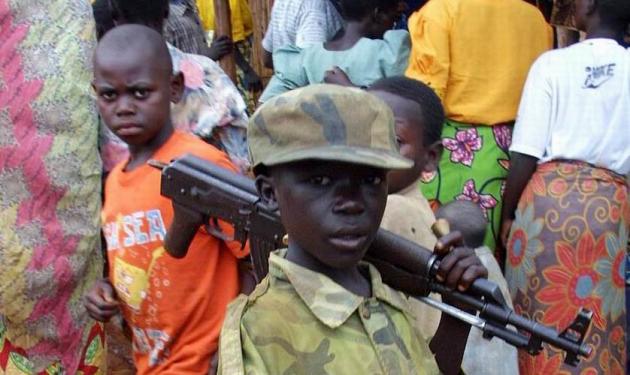When the kids are the killers

The UN's commander in Rwanda offers a plan for disarming child soldiers. Admirable, if wishful, thinking
They Fight Like Soldiers, They Die Like Children
By Romeo Dallaire
Published by Arrow Books, 2010
Available at Asia Books, Bt316
Reviewed by Paul Dorsey
The Nation
It’s quite moving to see soldiers return from war loathing the thing, as is often the case. Most would gladly hear that there’ll never be another one, but there always is another, and among the combatants slaughtered in its course will be more innocents.
Perhaps, then, it could be more civilised, seems to be Roméo Dallaire’s thrust in “They Fight Like Soldiers, They Die Like Children”, the second of his books drawn from the particularly savage conflict in Rwanda two decades ago. The Canadian retired lieutenant-general led the United Nations peacekeeping force in its disastrous mission there, earning international praise for at least trying to prevent the ensuing genocide.
His first book, 2003’s “Shake Hands with the Devil”, was about how the world allowed
the genocide to occur. “They Fight Like Soldiers” is about how and why government
and rebel leaders in Central Africa and elsewhere put guns in the hands of kids and what
needs to be done to stop it.
Writer Jessica Humphreys evidently helped Dallaire draw out the inner anxieties that
haunted him for many years after Rwanda, and the psychoanalytical approach produces an
interesting mix of cool reasoning and flights of fancy.
The latter are cleverly deployed to place the reader in the position of both the foreign adult
soldier and the armed and determined local youngster he is shocked to encounter.
“Imagine yourself on a hillside” is a recurring phrase, leading to the direct challenge:
What do you do when a child is pointing a gun at you? Shoot him first, according to your basic
training. Resist the instinct, according to your sense of humanity, and try to restore his stolen
childhood.
“I saw them, heard them, faced them down, and ultimately confronted them in the midst of
a carnage that swallowed their youth and my professional warrior ethic.”
One chapter recalls a horrific scene in which a squad of youths swarmed through a village,
guns blazing. The UN soldiers came running and obeyed their orders. Soon, to the foreign
ers’ intense revulsion, several very young teenagers lay dead, still clutching their assault
rifles.
Dallaire offers some background history on the conflict between the Hutu and Tutsi, the
moderates overwhelmed by the extremists. There are the explanations as to why both sides
arm their children.
And then suddenly there’s a remarkable chapter narrated by a child in a dusty village –
“my sister and I, basking like baby dragonflies in the hot midday sun”.
Among the surprising facts that emerge, there are almost as many girl soldiers in
Central Africa as boy soldiers, and many of the kids volunteer to fight, not because of ideology,
certainly, but for a string of far more practical reasons.
In the recruiter’s eyes, Dallaire points out, each youngster is a “weapons system” that
requires next to no technology or food, is astonishingly versatile and, with a minimum of
coaching, will be as loyal and as barbaric as any despot could wish.
However, the bulk of the book concerns the dreary bureaucracy involved in trying to end
the recruitment, along the lines of “Make some new rules not foreseen by the Geneva
Convention, say ‘No more child soldiers’.”
He submerges into the usual diplomatic gibberish about mechanisms and platforms,
appeals and petitions and bills of rights – none of which, of course, can take a bullet on the
battlefield.
Dallaire belongs to the Montreal Institute for Genocide and Human Rights Studies and
the Will to Intervene Project, and also to the Canadian Senate. For all his complaints about
politicians, I imagine him fitting into the political grid nicely, but what an aggravating turn to
the story about the dragonfly siblings of that dusty village.
Romeo Dallaire appears to be one of the good-hearted, right-thinking people pushing
for noble causes, and he presents a plausible strategy for eradicating child enlistment. But it
won’t be eradicated, because war isn’t like that. War is a meat grinder, heedless of what kind of
meat it’s fed, as are the butchers who feed it. Of course, it’s possible that the American-
style war waged with aerial drones will catch on globally. (Even poor countries seem able to
find the cash for expensive armaments.) Robotic ground troops can’t be that far off.
This isn’t exactly something to “look forward to” but at least, in such an event, all talk of chil
dren fighting battles would become moot.
In the meantime, if kids are such obedient, cheap, malleable, expendable “weapons sys
tems” as Dallaire demonstrates, the butchers will find a use. The butchers regard all humans
as cannon fodder – we all know that. What’s the difference if they’re 18 years old or 12?





